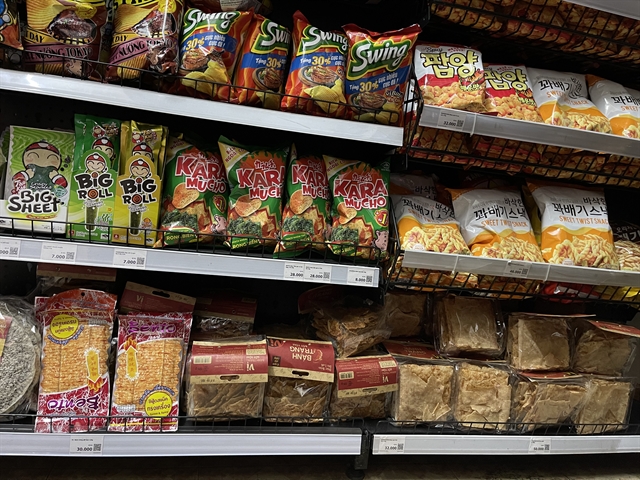Viet Nam’s retail sector was growing quite quickly, with a market size of US$180 billion within the next three years. This would also be an opportunity for fast-moving consumer goods (FMCG) and food products from many Vietnamese startups.

The retail market in Viet Nam has been evolving fast in recent years with strong growth in modern distribution channels such as supermarkets.
This has resulted in many opportunities for good producers and suppliers. But for most start-ups, it remains a hard task to bring their food products into big supermarkets.
Hoang Thi Thao, CEO of Ha Noi-based Thanh Thanh Food JSC, said her start-up, which is providing processed foods such as salt-brewed chicken, boneless chicken feet soaked in soy sauce, and chicken feet soaked in salt and pepper, has failed to access big supermarket chains after two years of operating.
"The company's goal is to access big distribution channels to promote our brand, increase our sale revenues and expand our market share," Thao told Viet Nam News.
In order to access these channel, Thao said her company had spent months having products qualify for standards of the Hazard Analysis and Critical Control Points (HACCP) and One Commune-One Product (OCOP), while investing in product packaging and labels and then sending the offer documents to many big supermarkets.
"But, until now we have yet to receive any positive response from big supermarkets," Thao told Viet Nam News, adding that it was still hard for start-ups to get access to big supermarkets due to the small-scale and insufficient financial and production capacities.
"Thus our products are only sold at some convenience stores, mini supermarkets and snack shops in Ha Noi and some other provinces," Thao added.
Another start-up in Ha Noi, Moris Production and Business Co., also gave up its intention of getting food products on supermarket shelves after the first attempt.
The company's director Tran Thi Huong said that strict requirements for product quality and quantity and terms of contracts gave her start-up a headache.
For example, the contract terms which defined the long payment period from one to six months gave her start-up insufficient financial capacity and those required products were already distributed to one big supermarket.
High costs for bringing products to big supermarkets also made her hesitate, Huong said.
Despite these difficulties, a start-up has successfully distributed snack foods to big supermarket chains.
Hoang Bao Tram, director of 2G Company in HCM City, told Viet Nam News that her key snack foods, including rice paper with shrimp flavor, rice paper with shrimp sauce, dried pork and scorched rice, have been placed on shelves of big supermarkets such as Vinmart and AEON as well as GS25, Ministop, Circle K convenience stores, and Phuong Nam and Fahasa bookstores.
Tram said she considered big supermarkets as target customers even before she established her start-up. She managed to distribute banh tet (a glutinous rice cake filled with green bean paste and pork) to AEON supermarkets and then gradually gain the trust of other customers.
Tram added that when she first brought food products into shelves of big supermarkets, she had to accept losses thus had to utilise her existing personnel resources instead of recruiting ones.
"Though it's costly for us to bring products into big supermarkets, they are places where we can advertise our brands, affirm the quality of our products, so we can distribute products in other distribution channels, " Tram said.
"Currently, 80 per cent of our sales revenue come from supermarkets. However, the remaining 20 per cent come from other channels such as distributors, agents and retailers that can help our start-up survive and have sufficient cash flow to further develop."
Amid the pro-longed COVID-19 pandemic, Tram said she had focused on accelerating online sale activities and was seeking new snack foods from provinces nationwide to better meet the tastes of customers, typically young ones.
Tram added her start-up company fulfilled its yearly revenue target of VND25 billion (over US$1 million) in August.
During a recent meeting in Ha Noi, Deputy Minister of Science and Technology Tran Van Tung said Viet Nam’s retail sector was growing quite quickly, with market size of US$180 billion within the next three years. This would also be an opportunity for fast-moving consumer goods (FMCG) and food products from many Vietnamese start-ups.
In order to access domestic and foreign distribution and retail channels, start-ups needed to make timely adjustments in structure and production capacity to meet market demand, Tung said.
Distributors at the meeting suggested start-ups that wanted to get their products into supermarkets have had a specific orientation about customers. In particular, connecting goods supply and demand was described by distributors as one of the important solutions to bring goods into distribution systems, helping goods become directly accessible for consumers.
In addition, businesses should pay attention to product quality, packaging design and product development and marketing orientation.
Updating customer feedback to make timely improvements and changes in line with market needs should also be included.
According to trade experts, participation in the modern distribution chain was not easy for most start-ups because their scale was still small, resulting in their failure to meet basic criteria such as legal documents, quality certification and packaging design.
Therefore, instead of being alone on the journey to connect with supermarkets, start-ups need a connecting and leading role from State management agencies. — VNS





